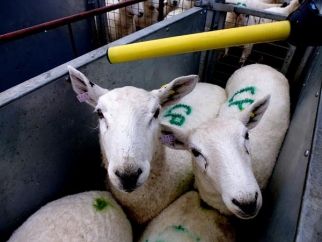- Home
- News & Industry
- New Welsh Farming Age Dawns After Huge Success of HCC EID Project
New Welsh Farming Age Dawns After Huge Success of HCC EID Project

A comprehensive sheep industry project that encompassed more than a quarter of the Welsh ewe flock has achieved radical, permanent and cost effective positive change and paved the way for a new age of farming in Wales.
That’s the verdict from an independent assessment of impacts from the Removing the Barriers to Electronic Recording of Sheep Flocks in Wales project.
The Hybu Cig Cymru-Meat Promotion Wales (HCC) managed project was “well organised and delivered, exceeded its target for participants, had high additionality, and resolved market failure as without RDP funding and Welsh Government support, 71 per cent of participants would not have taken part in the project and purchased EID recording equipment”, specialist independent project assessors Brookdale Consulting concluded.
Dr. Julie Finch, HCC’s Corporate Strategy and Policy Manager said: “This exemplary project was cost-effective, hugely successful for uptake, drove lasting engagement, permanent industry change and delivered around a quarter of the Welsh ewe flock.
“Around nine in every ten of participants said that it helped them understand more about the benefits of EID recording, EID equipment and its uses and helped them to understand how to get the most from EID equipment.
“A total of 1,716 businesses completed this RDP funded project and the farmers involved represented a wide cross section of sheep producers from across Wales,” she said. “Of these, only 103 (6 per cent) had some previous experience in using EID so, for the majority of participants, using EID equipment was a completely new experience,” said Dr. Finch.
The findings from Brookdale Consulting said:“These results suggest that the project will have a substantial longer term impact on the participants who represent a sizeable proportion of the Welsh sheep flock. The 1,716 beneficiaries potentially represent 26 per cent of the flock.
“As well as time saving, they anticipate management decisions being made to improve their flocks. There is strong evidence to suggest that EID recording will enable these producers to significantly improve their flock productivity and overall labour productivity for the benefit of Welsh agriculture.”
Dr. Finch said that it was not surprising to find that the cost and complexity of equipment was the main barrier reported by sheep farmers. “The project’s provision of some financial support for participants overcame these concerns and helped uptake.
“Many were sceptical at first that they understood enough about EID recording to justify the investment and, indeed, the assessment shows that nearly three-quarters of participants said that they were unlikely to have started using EID without the support that the project had provided.”
The tremendous take-up and delivery was achieved in just nine months from November last year but by the end of the project in August 2015, an incredible 92 per cent of the participants had started to use EID to record their flocks.
The majority of participants had used EID for tag reading and recording movements. Despite the time taken to get used to using the equipment and the software, many of the participants also reported some early benefits from using EID recording in terms of time saving, the ease of data collection and the accuracy of the data.
“There is a strong, lasting legacy from this project,” said Dr. Finch. “Participants were enthusiastic about the opportunities EID provided and said they were planning to use it for a wider range of tasks, with 29 per cent planning to use it to identify their best performing sheep and 41 per cent planning to use it to help them to identify problem/cull sheep.
At the end of the project farmers were keen to learn more about using EID recording so that the benefits could be fully realised. Training opportunities, practical on-farm events and discussion groups were highlighted as useful ways to exchange information and ideas.
“Thirty per cent (30 per cent) said they were also planning to make use of it during the next lambing season to record lamb performance, to collate health information and for recording deaths/lamb losses,” she said.
A series of case studies in which 10 of the project farmers share their experiences is available at www.ewemanage-IT.org.ukand two new booklets have been produced to encourage other farmers to try EID recording.

